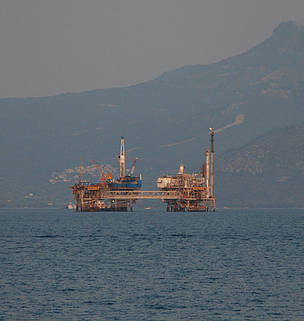The WWF is run at a local level by the following offices...
- WWF Global
- Adria
- Argentina
- Armenia
- AsiaPacific
- Australia
- Austria
- Azerbaijan
- Belgium
- Bhutan
- Bolivia
- Borneo
- Brazil
- Bulgaria
- Cambodia
- Cameroon
- Canada
- Caucasus
- Central African Republic
- Central America
- Central Asia
- Chile
- China
- Colombia
- Croatia
- Democratic Republic of the Congo
- Denmark
- Ecuador
- European Policy Office
- Finland
 © Edward Parker
© Edward Parker
A WWF study — MedTrends, run by the WWF Mediterranean Marine Initiative and funded by Programme Med — provides detailed information on the future trends of Mediterranean maritime sectors, and how these trends might affect, positively or negatively, marine ecosystems. The study provides the most up-to-date outlook on the present development of key economic sectors in the region and has developed scenarios for the next 15 years. By overlapping existing and proposed areas of conservation with the current and predicted development of economic sectors, MedTrends has identified critical planning hotspots in the region, demonstrating that — based on the trends in economic sectors in the region — the achievement of GES by 2020 is highly unlikely. MedTrends produced key recommendations concerning the adoption of ecosystem-based management principles in the implementation of the Maritime Spatial Planning Directive.
The MedTrends report and all relevant data and maps are available on a dedicated site: medtrends.org
...
In a ‘business as usual’ scenario, the current exploitation of maritime space and resources is simply not sustainable. The only way to ensure that the Mediterranean Sea will continue to support our national economies and to promote a sustainable blue economy is an integrated management of the maritime space.
Giuseppe Di Carlo, Director, WWF Mediterranean Marine Initiative

© George Paximadis / WWF Greece
Over 20% of the Mediterranean basin is currently covered by oil and gas exploration contracts. Offshore gas production is to increase five-fold by 2030.
 © WWF
© WWF
As the map above demonstrates, MedTrends provides evidence that economic growth will seriously impact Mediterranean conservation hotspots. The large-scale areas of intense interaction between Blue Growth and sites of conservation interest in EU Mediterranean countries shown here indicate that there is an urgent need for integrated ocean management measures which address cumulative impacts.
Except for professional fisheries, all traditional sectors of Mediterranean maritime economy such as tourism, shipping, aquaculture and offshore oil and gas are expected to keep growing during the coming 15 years (see infographic for further details).
MedTrends is the first complete and integrated picture of the growth of economic maritime activities in eight Mediterranean countries (Croatia, Cyprus, France, Italy, Greece, Malta, Slovenia, Spain).

© WWF
interview: a closer look at MedTrends
Catherine Piante of WWF France, MedTrends project leader, talks about how the MedTrends analysis is a contribution to a better integrated and more effective management of Mediterranean space and resources.

All sectors are growing rapidly, but four need to be watched carefully: tourism, maritime traffic, oil and gas and fisheries. The last two are global issues — oil and gas because it is developing so quickly, fisheries as it is key for feeding humanity.
What is a Sustainable Blue Economy?
For some, Blue Economy means the use of the sea and its resources for sustainable economic development. For others, it simply refers to any economic activity in the maritime sector, whether sustainable or not. WWF has developed a set of principles towards a shared understanding about what characterizes a sustainable Blue Economy. Basically, for the use of the sea and its resources, it is a marine-based economy that:
- Provides social and economic benefits for current and future generations, by contributing to food security, poverty eradication, livelihoods, income, employment, health, safety, equity, and political stability
- Restores, protects and maintains the diversity, productivity, resilience, core functions, and intrinsic value of marine ecosystems – the natural capital upon which its prosperity depends

- Is based on clean technologies, renewable energy, and circular material flows to secure economic and social stability over time, while keeping within the limits of one planet.
It is vital to address land-based impacts on marine ecosystems, recognizing that maritime and land-based economies are interlinked and that many of the threats facing marine environments originate on land. Active cooperation is also key, sharing information, knowledge and ideas, to reach out across borders and ensure collective stewardship of our common marine heritage.
The MedTrends project has delivered some impressive results. What do you see as the next, most important steps?
Sharing the results with decision makers so that they take them into account. Adopting a prospective vision for policy-making is a must. Just as the private sector plans for the infrastuctures needed for its development, we must learn to ancipate growing impacts on the environment. For this we need an integrated approach to all maritime sectors.